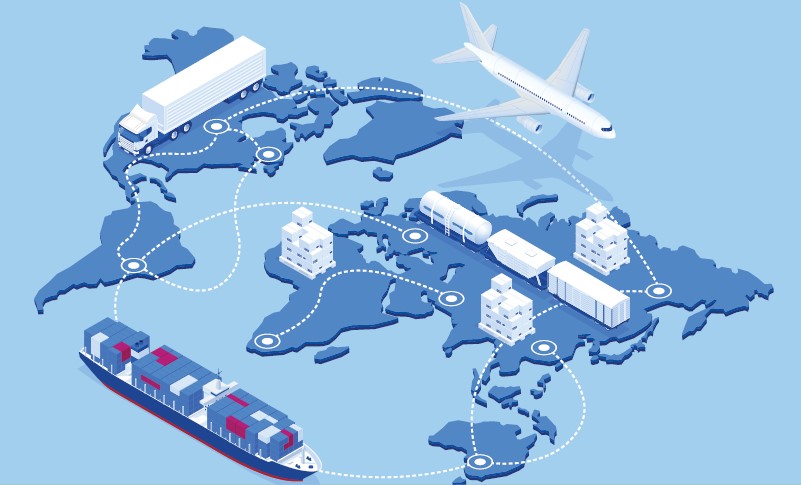Today, it’s easier than ever to build a successful business. And that means you have a great opportunity to provide jobs to the community. However, there are things that you can do to ensure your supply chain is as efficient as possible.The most important thing for any company is to have a supply chain that is both flexible and efficient. We have some tips that will help you in your journey.
Outsourcing your logistics can be a daunting task. You need to make sure that you are choosing the right partner, that your supply chain is structured effectively, and that you are making the most of the resources you have.
Making the wrong decision when outsourcing your logistics can be costly and damaging to your business. You need to make sure that you are well-informed about what to look for in a partner and how to effectively structure your global supply chain.
In this article, Our 5 tips on how to manage a global supply chain will help you make the most informed decisions possible when outsourcing your logistics. We’ll provide advice on how to reduce costs, increase efficiency, and make sure that your supply chain is running smoothly so let’s begin.
How To Manage A Global Supply Chain?
As the world becomes increasingly interconnected, businesses are finding that they need to expand their operations on a global scale in order to stay competitive. This presents a unique challenge when it comes to managing a supply chain, as there are a number of factors to consider.
- First, businesses need to choose the right location for their facilities.
- They also need to establish efficient transportation networks and build relationships with reliable suppliers.
- In addition, they must be able to effectively communicate with all members of the supply chain, from suppliers to customers
- By carefully planning and managing their supply chains, businesses can ensure that they are able to meet the demands of the global marketplace.
5 Tips On How To Manage A Global Supply Chain
1. Have a comprehensive understanding of your global supply chain
The first step to effective global supply chain management is understanding your own needs. What are your specific goals? What do you need from your logistics partner? What can you realistically accomplish given your resources? Once you have a clear idea of your own needs, you can begin to look for a partner who can best meet them.
Knowing every aspect of your supply chain is critical to keeping it running smoothly. Understand where your products come from, how they are made and shipped, and where they end up. This will help you identify any potential problems and make necessary changes.
2. Evaluate and optimize your global supply chain network
Take a close look at your supply chain network and identify any areas that could be improved. Make sure you are getting the best possible prices from suppliers and that your products are being shipped efficiently.
Moreover, not all logistics providers are created equal. When you’re looking for a partner, it’s important to do your research and find a company that has experience in managing global supply chains. Ask for references and case studies, and make sure you understand the company’s process and capabilities.
3. Implement and structure your robust process management practices
Good process management is essential for any successful business, but it is especially important in a global supply chain. Make sure you have systems and processes in place to track and manage your supply chain effectively. An effective global supply chain is one that is structured efficiently. You need to consider things like lead times, transportation routes, and customs regulations when you’re planning your supply chain. Working with a logistics partner who has experience in structuring global supply chains can be a big help.
4. Use technology to help manage your global supply chain
Technology can be a great asset in managing a global supply chain. There are many software applications and tools available that can help you automate and streamline your supply chain processes. Technology can be a big help when you’re managing a global supply chain. Also there are a number of software solutions that can help you track your shipments, automate your processes, and keep your costs down. Make sure you’re taking advantage of the latest technology to make your supply chain as efficient as possible.
5. Stay ahead and flexible of the curve by anticipating changes in the market
The global marketplace is constantly changing, so it is important to stay ahead of the curve. Anticipate changes in consumer demand and the availability of raw materials. This will help you make necessary adjustments to your supply chain in a timely manner.
The world of logistics is constantly changing, and you need to be able to adapt to the ever-changing landscape. Things like new regulations, shifting customer demands, and unexpected events can all impact your supply chain. Staying flexible and being able to adjust your plans on the fly is key to keeping your supply chain running smoothly.
By following these tips, you can effectively manage a global supply chain. Stay informed and be proactive to keep your supply chain running smoothly.
Conclsuion
As we saw in the above tips, managing a global supply chain is not an easy task. But if you’re willing to put in the time and effort, it’s definitely worth it. It’s important to make sure you have a clear vision of what you want to accomplish and that you have a clear understanding of your supply chain. Then you can work with a logistics partner who can help you implement a robust process management system and use technology to streamline your supply chain. By staying flexible and keeping your plans on the fly, you can keep your supply chain running smoothly.
You also need to be able to anticipate and plan for changes that could impact your supply chain. Moreover, you need to work with a logistics partner who has experience in managing global supply chains. You need to know where your products are coming from, how they are being made, and where they are going.
Thanks for reading!



